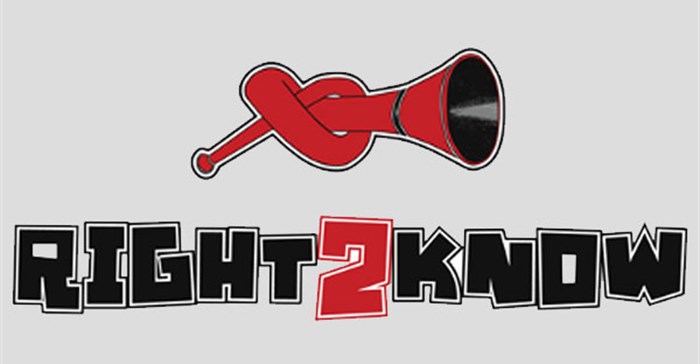On this Africa Day, the Right2Know campaign has highlighted the gross violations of the right to free expression taking place across the continent, as well as the continued imprisonment of journalists.

Right2Know
This is the full text of the R2K statement:
“From Cape to Cairo we continue to witness attempts by the powerful to clamp down on media rights and free expression. Some of the most glaring abuses have taken place from Egypt to Eritrea, Kenya and Angola, where the governments of these countries offer stark proof of the oppressive relationship between power and respect for freedom of expression.
With shock we witnessed severe police brutality towards Kenyan protesters earlier this month. We stand with those who have condemned these acts of brutality, and call for respect for the right to protest by Kenyan authorities.
In Egypt, 152 people were sentenced for breaking a draconian law that effectively bans protests, also this month. The country’s compromised judges are in the habit of handing down severe penalties to dissenters and critics of the regime after brief hearings marked by procedural irregularities. The judiciary has been drawn fully into the state’s apparatus of repression and now appears to exist simply to process those brought before it for sentencing.
The highly publicised trial and sentencing of the three Al-Jazeera journalists – Peter Greste, Baher Mohammed and Mohamed Fahmy – showed just how farcical the courts in Egypt have become. Their trial was presided over by the notorious Mohammed Nagy Shehata, Egypt’s “Executioner Judge”, who seemed to relish his minor celebrity status by sporting dark glasses in court and who is said to have sarcastically told the journalists “Happy World Press Freedom Day”. Over a year ago, Shehata ratified the mass death sentence of 183 supporters of the Muslim Brotherhood and, days later, sentenced 230 people to life in prison over their alleged role in a mass sit-in, to which police responded with live ammunition.
On the pretext of combating “terrorism”, the security forces stamp out dissent with extreme brutality and almost total impunity, filling the country’s prisons with political prisoners and activists whose only offence has been to stand up against the regime. Egypt is currently one of the world’s biggest jailers of journalists, most of them locked up on trumped up charges.
The Angolan authorities show similar contempt for fundamental rights. As in Egypt, the Angolan judiciary is used for political ends. In March this year, 17 youths were given jail terms of between two and eight years – essentially for reading a well-known book by author Gene Sharp on non-violent civil resistance. They were charged for allegedly planning a plot to topple President José Eduardo dos Santos. The charges stemmed from a June 2015 meeting in which the group discussed the book.
…This Africa Day, we express our admiration and solidarity for the many other courageous activists, journalists and bloggers across Africa who refuse to be silenced, even in the face of serious danger…
Last year, in what was essentially a show trial, a Luanda court sentenced journalist Rafael Marques de Morais to a six months suspended sentence for criminal libel. Marques was persecuted for exposing serious human rights abuses in Angola’s diamond mining areas that implicated the country’s top generals. The judiciary duly acted on the generals’ bidding.
We remember Eritrean journalist Seyoum Tsehaye, incarcerated now for 14 years – the longest served sentence by any journalist in Africa. We call on the Afweri regime to release him immediately.
This Africa Day, we express our admiration and solidarity for the many other courageous activists, journalists and bloggers across Africa who refuse to be silenced, even in the face of serious danger to their own lives. We remain mindful that the noble ideal of free expression in South Africa, enshrined in our constitution and Article 9 of the African Charter on Human and Peoples’ Rights was hard won and must be determinedly defended.
We call on the South African government to actively promote free expression at home and abroad, whether practiced in the form of peaceful protest, a critical media, or any other form of expression. We demand the African Union show greater commitment to promoting protection of journalists and encourage freedom of expression.”
Source: Right2Know










